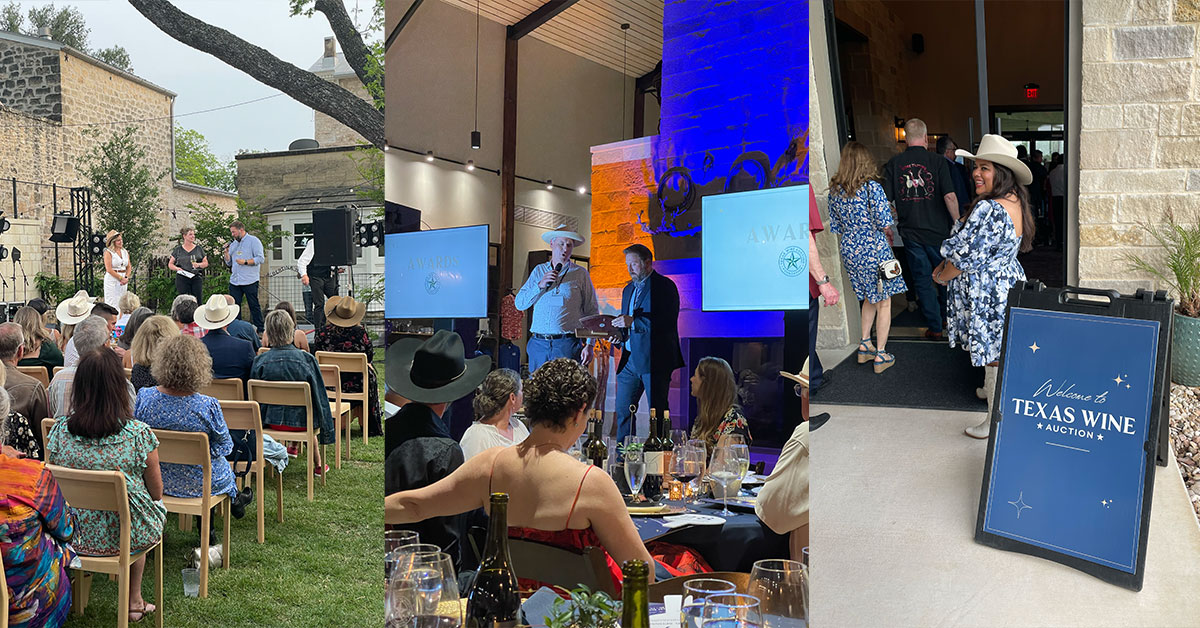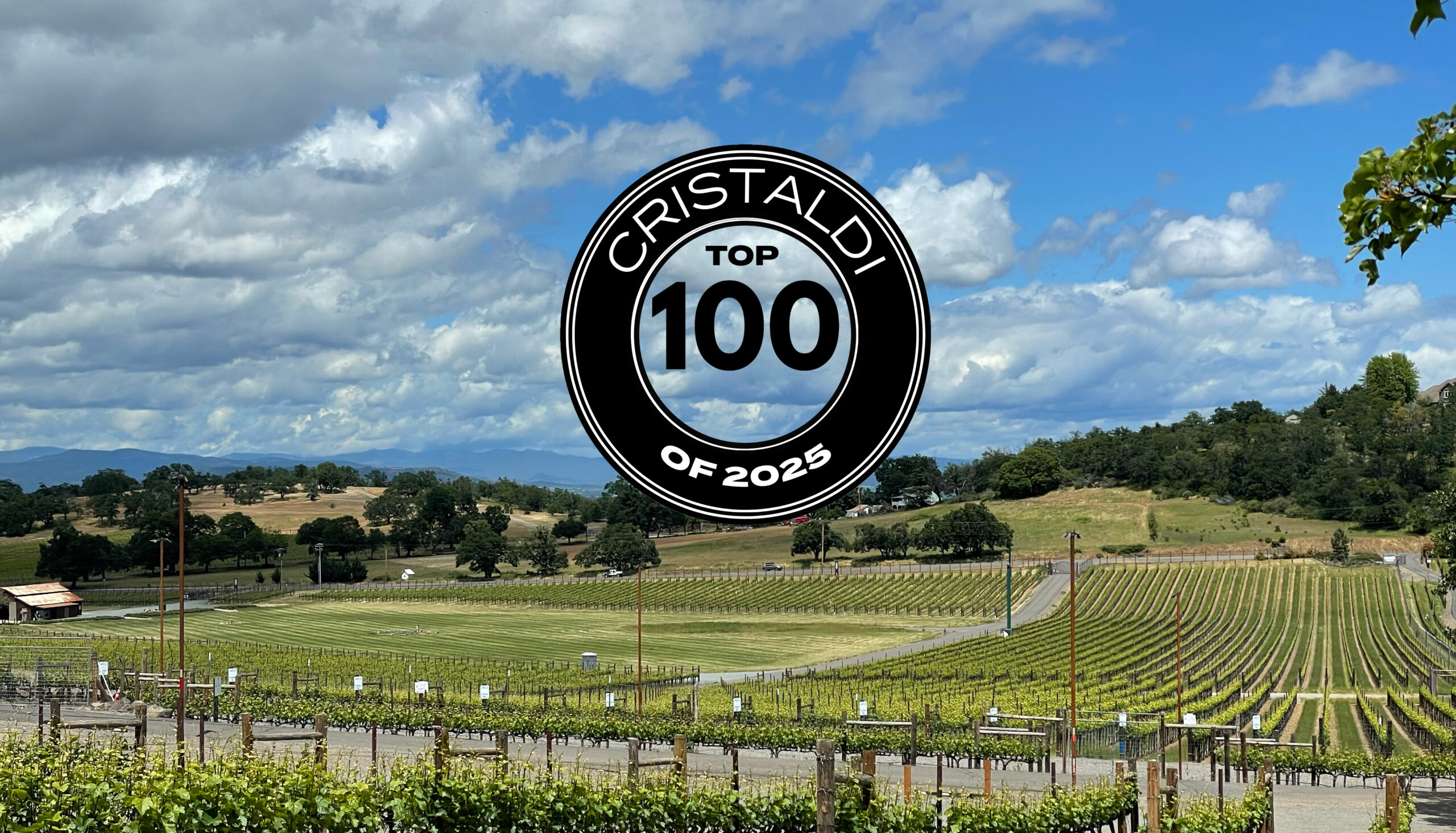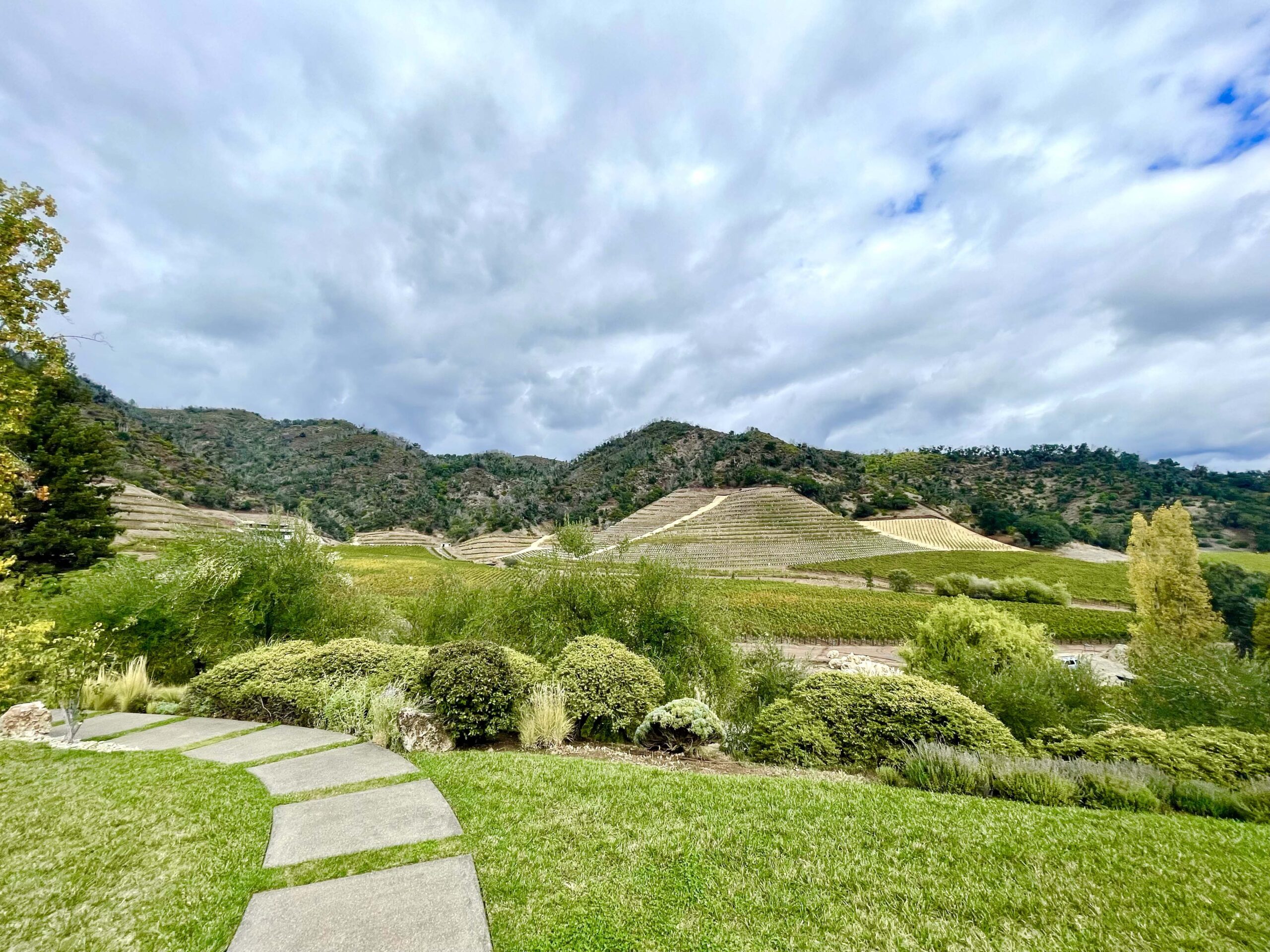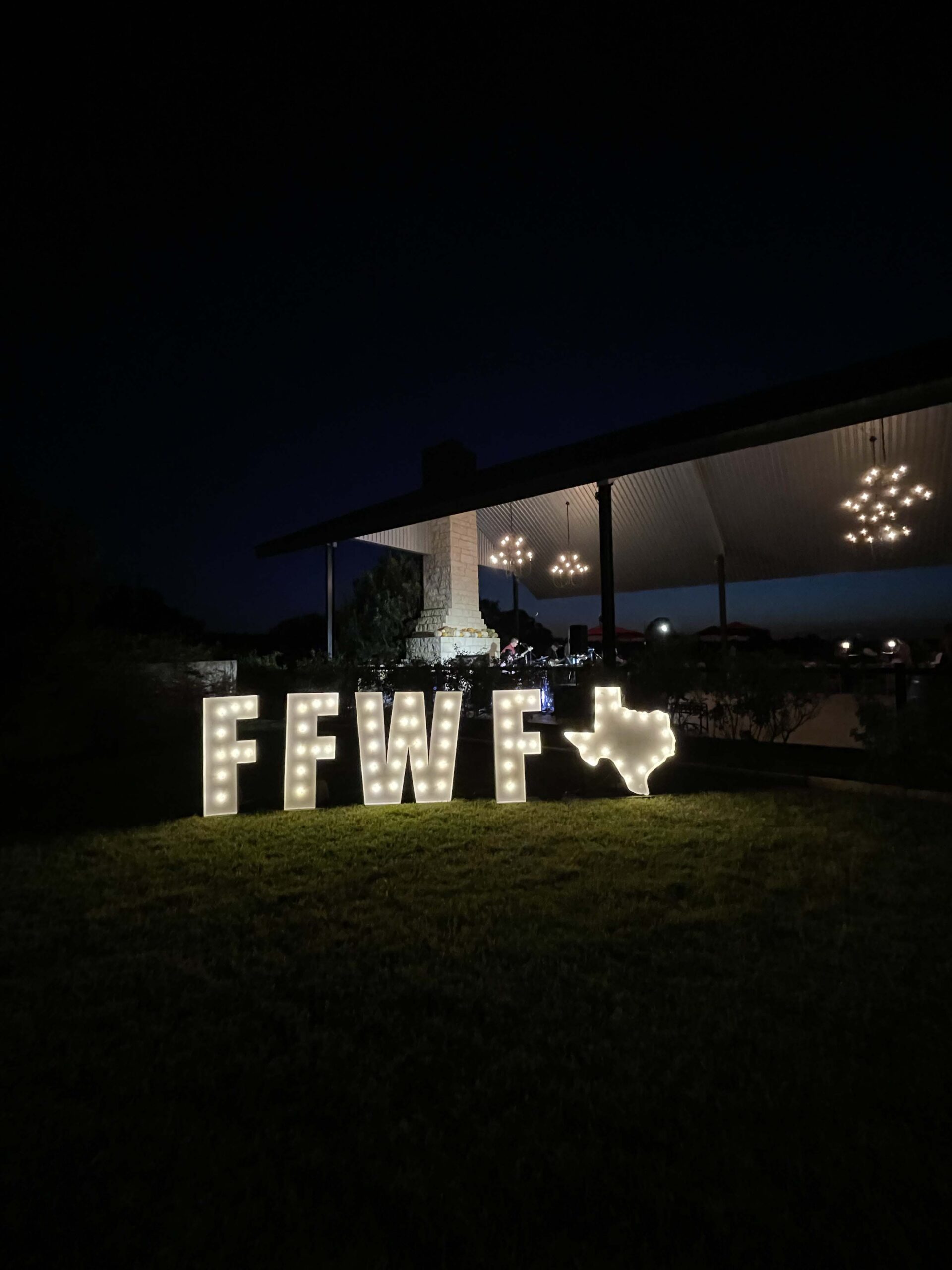My first visit to Fredericksburg, Texas, in the heart of the Texas Hill Country AVA, was in November of last year (2024). If you haven’t perused my comprehensive report featuring numerous wineries and wines, I encourage you to have a look (and check out the updated Itinerary section) and then come back here.
From April 24-27, 2025, I cruised along at 70mph between visits along Hwy 290. I was there to experience the fourth annual Texas Wine Auction, and I wrote about their successful, record-breaking event for Decanter.
I also visited a spate of wineries I didn’t have time to experience during my first trip, and that is the focus of this, Texas Wine Report (Part II). Whether you’re a consumer or a professional wine buyer, I hope the producer profiles below pique your interest in visiting or seeking these wines out for your personal collection or programs. I’ve provided links below each producer to the reviews and scores for easy reference.
Having now tasted over 300 wines from Texas and visited 15 estates, I want to express to you, dear reader, a sincere enthusiasm for what is taking place in the Lone Star State. It’s a very exciting time for wine lovers because prices are reasonable, and the Hill Country is witnessing explosive growth with new restaurants, cafes, food trucks, and hotels coming to town. So, I hope you’ll visit Fredericksburg and see for yourself.
Pro tip: I strongly recommend booking a room at the swanky new Albert Hotel, a luxe oasis in the heart of downtown Fredericksburg, with gated access to Main Street and more than 150 locally-owned stores, boutiques, and art galleries. Make sure to grab a cocktail at the bar before heading to dinner. It’s the kind of scene to be seen. And, bring your Peleton shoes, because they have a bike.
Quick Links
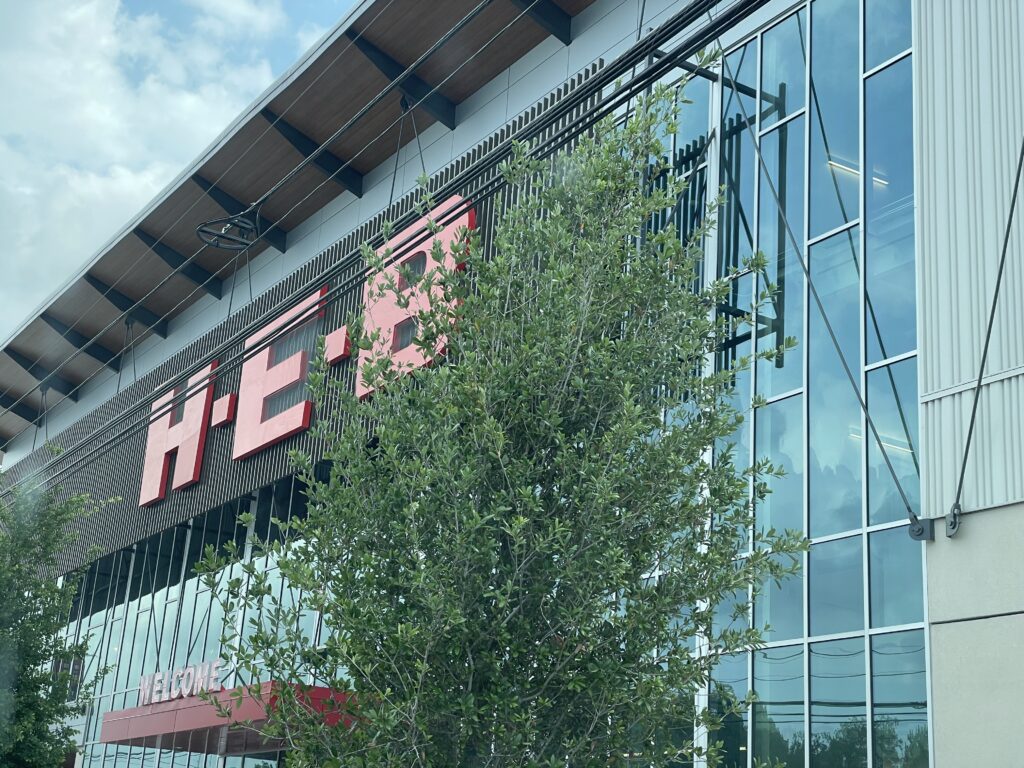
H-E-B
After touching down in Austin, I jumped into my rental car and drove about 13 minutes from the airport to the new H-E-B store at 2400 S Congress Ave in Austin, TX.
There are hundreds of H-E-B stores throughout Texas and nearly 200 of them have dedicated wine stewards. How amazing is that, for a supermarket?
Stephen Bacon is the Wine Steward at this store, which opened in December of 2024. It’s one of the biggest in Central Texas. Believe me, it is Texas-sized.
Unfortunately, travel delays caused me to miss meeting Stephen, but I got a tour and tasting in with Jayland Taylor, a beer and wine specialist, and Aria Schmierer, a junior beer and wine specialist.

“There’s something here for everyone,” said Schmierer, “Tall Boys of Bud Ice? Got ya covered. Rare champagne? Got that too.”
The clientele is a huge range, with a lot of folks from the Travis Heights area, along with plenty of drinking-age college students, AirBnb-ers, and the occasional party bus. But mostly, locals, stopping in to shop the massive selection of domestic and international wines, along with a section dedicated to wines made with organic grapes, and of course, a huge selection of Texas wines.
PRODUCER FEATURES
Calais Winery / French Connection Wines
Founded: Calais was established in 2007; Ben Calais took over French Connection in 2019.
Owned by: Ben Calais (Calais Winery); Ben Calais, Sherri, and Pat Pattillo (French Connection)
Address: 1197 Hye-Albert Rd, Hye, TX 78635
House Style: Calais is Bordeaux variety-focused, and French Connection is Rhone variety-focused. Both produce a mix of reds (unfiltered) and whites.
Flagship Wines: Both wineries focus on 12-15 releases each vintage, adapting to variations in Texas weather and viticulture.
Winemakers: Ben Calais is the winemaker. His wife, Victoria, runs the tasting room. Partners, Sherri and Pat, do tasting as well.
Vineyard Philosophy: Calais describes their approach as “low input, trying to be Natural without saying ‘Natural’.” Their vines start at 3,200 feet elevation and go up to 5,400 feet elevation—some of the very highest elevation vineyards in the state (in the Texas Davis Mountain AVA), which can see winds as strong as 90 mph. They focus on having a low impact in the vineyard, conservation of resources, and sustainability over the long haul.
Interesting to note: From early April to early May, there is potential frost damage in the vineyard due to the elevation of their plantings. Dormancy and temperature swings have become more important concerns over time, particularly during the winter, where almost 40℉ temperature swings can occur.
Slate Theory Winery
Founded: The Jones family purchased Torre di Pietra winery in 2018, and invested in 1851 Vineyards the following year, rebranding to Slate Mill Wine Collective and operating as a custom crush facility. The first official release under Slate Theory was a 2017 Malbec, and the Slate Theory winery and cave opened in 2021. A new, expanded 8,500 square feet tasting room opened in 2025.
Owned by: Randy and Carroll Jones
Address: 10915 US-290, Fredericksburg, TX 78624
House Style: All Texas fruit, full-bodied but also food-friendly.
Flagship Wines: The Pharmacist (white), The Schizophrenic and The Phobic (reds).
Winemakers: Illinois-born Tyler Wolz moved to Texas to join his sister in the industry, working at William Chris and then joining Slate Mill as Cellar Master in 2020 (his side hustle is crafting armor and jewelry). Winemaker David Newitt retired from marketing in 2015 and bought property in Mason County with the intent to start his own wine brand. He began helping 1851 Vineyards, where he met the Jones family, who asked him to join Slate Theory. On the side, Newitt makes Loyal Valley Cellar wines from his vineyard.
Vineyard Philosophy: The property around Slate Theory totals 105 acres, with only 12 acres planted. Their estate fruit is culled from the Wedding Vineyard, where 93 acres of vines are planted on La Bonne Vie Ranch. Total production is around 13,000 cases annually.
Interesting to note: Named after John Locke’s “Blank Slate” theory, with a tagline of “Fill Your Head.” Their skull logo is a reference to Phrenology of the mind, and the crown adorning the skull has seven points (representing the founders’ children). Their wines are named after disorders, with a portion of the proceeds donated to mental health causes (via NAMI – the National Alliance on Mental Illness).
Art: In the photo gallery above are images of artwork hanging all over the winery and cellar. The artist featured is Cody Jones (@rex_bufo on IG), a co-founder of the winery. Jones’ work is displayed on the winery walls and also features on their bottle labels.
Augusta Vin
Founded: Land was purchased in 2016, with vineyard development starting the following year. Their tasting room opened in 2019.
Owned by: Scott and Christy Felder.
Address: 140 Augusta Vin Ln, Fredericksburg, TX 78624
House Style: High-end, with primarily single varietal bottlings, augmented by blends.
Flagship Wines: Petite Sirah and Tannat bottlings.
Winemaker: The wines are crafted by Head Winemaker Zachary Raines, along with Associate Winemaker Josiah Phinney, Cellar Master Cam McDonald, and Cellar Technician Frankie Aguilar.
Vineyard Philosophy: The winery sits on a roughly 120-acre estate, with half planted to vine. Varieties planted include Counoise, Albariño, and Picpoul Blanc for whites, along with Sagrantino, Petite Sirah, Tannat, Malbec, Tempranillo, Souzão, and Cabernet Sauvignon for reds.
Interesting to note: The winery also sources from the Texas High Plains and the Davis Mountains AVAs. The space itself is expansive, modern, and comfortable, with ample places to lounge and sip. Be sure to ask about Wine Club Member benefits, as the winery has entire spaces set aside for members, which have an elevated feel.
Blackmon Wines
Founded: Bill Blackmon felt he’d farmed enough of the High Plains, and in 1996, made his way to the Hill Country and developed Granite Hill Vineyards. By 2008, he began buying grapes from Granite Hill to make his own wine, when he met Chris Brundrett, a young college graduate, who partnered with Bill to establish William Chris Vineyards, which opened its doors in 2010.
Owned by: Bill and Beth Blackmon. Bill Blackmon grew up in Lubbock near Brownfield, Texas, in the High Plains. He began farming at the age of 11, raising cotton, grain, and wheat, and continued to farm even after graduating from Texas Tech. In 1983, after a few years of seeing neighbors plant vineyards, he figured he’d give grape-growing a chance. By 2005, he and Beth purchased the property outside the town of Mason that would become the Blackmon Ranch Vineyard.
Address: 120 Moody St, Mason, TX 76856
House Style: Bordeaux-inspired wines.
Winemaker: Bill Blackmon with Tony Offill.
Vineyard Philosophy: The Blackmon Ranch in Mason, Texas, is an 85-acre ranch with just a little over 7 acres planted to vines, at around 1,850 feet elevation. His best wines—Cabernet Sauvignon and Merlot—are low-yielding, giving around 1-3 tons per acre. Other Bordeaux varieties are planted as well, like Malbec, which yields roughly 3-4 tons per acre. The vines are all rooted in the hickory sands — decomposed granite, and they have access to water that sits atop the granite in an aquifer. When asked how he found the remote location for a vineyard he explained that after farming his entire life, he feels he knows where to find good soils for growing grapes in Texas; pointing to an overgrown Mesquite field nearby, and noted that “when you see a mesquite grove like that, it’s a good sign that there are healthy soils.” Today, Atlas Vineyard Management farms Bill’s vineyards.
Interesting to note: Bill and Beth built an old-school house near the vineyard, made in the homesteader’s ‘dog trot’ style, with a covered breezeway separating two living spaces. On one side is a kitchen and living area, and on the other are bedrooms and a bathroom. “They call it a dog trot, because all the dogs would come and lie down in the heat of the day because it was shaded and cool,” explains Blackmon. “Back in the day, it’s where people would do their cooking because there’s always a breeze, and it made cooking over an open fire more manageable.”
Robert Clay Vineyards
Founded: 2015 was the first official vintage of Robert Clay Vineyards (after farming a local vineyard since 2012 and home winemaking in Mason, TX)
Owned by: Dan and Jeanie McLaughlin.
Address: 113 Austin St, Mason, TX 76856
House Style: McLaughlin prefers to extract as much color and skin tannins as possible, so that his wines stand up to long periods of aging the bottle: “I do that because I am trying t o minimize sulfites, and I know I’m going to age things for a long time; that tannin structure is going to allow me to the do that.”
Flagship Wines: Hickory Sands Chardonnay
Winemaker: Dan McLaughlin
Vineyard Philosophy: McLaughlin describes their approach as “time and patience,” preferring to pick at full physiological ripeness. They do not use filtering or fining, or cold stabilization, as Dan believes each one removes a bit of the wine’s character.
Interesting to note: The McLaughlins have a daughter who teaches at Texas State, and son Blake works with them in the vineyard. They are moving to an allocation model after 2025, keeping production under 500 cases.
Inwood Estates Vineyards
Founded: Inwood in Fredericksburg was established in 2003.
Owned by: Dan Gatlin
Address: 10303 U.S. 290 East, Fredericksburg, TX, 78624
House Style: Low-yields, with a focus on proper phenolic ripeness (to which Gatlin has published several essays, available on the winery website). He recalls that when first starting, he decided that “we’re not going to be Modesto and compete with Gallo, and we are going to make less wine but better wine,” which meant “reducing yields and going after the consumers who were interested in the French [wine] market.”
Flagship Wines: Colos and Magnus (used to compare to Vega Sicilia, Termanthia).
Winemaker: Dan Gatlin and his son, Spencer Gatlin
Vineyard Philosophy: Gatlin’s approach to grape growing is rooted in a good deal of experience — he’s farmed in the High Plains since 1997. Science is another drive — particularly related to how phenolic development is achieved in Texas versus Napa Valley. He aims to grow fewer clusters per vine, controlling yields per acre. “It can be done,” he notes, “we have glimmers of success.”
Interesting to note: Gatlin helped plant one of the first vineyards in North Texas in 1981. He also worked with Niel Newsom on the first Tempranillo plantings in the High Plains in 2000 (in what is now Newsom Vineyard. Gatlin says that the Tempranillo planting was such a success that in 2003, when he released his first Tempranillo-Cabernet blend, it was priced at $40 (at the time, the more expensive Texas wines topped out under $25 — the idea to price his wine higher may have come from personal experience. Gatlin’s family ran Hasty, a chain of liquor stores, which were the first to stock their shelves with a wine from Charlie Wagner called Caymus — the first placement in retail outside of Napa Valley, according to Gatlin.
Rhinory
Founded: Founded 2019, with tasting room opened in 2022.
Owned by: Craig Stevens and Chesney Castleberry
Address: 13112 US-290, Fredericksburg, TX 78624
Flagship wine: The Horn Red Blend
Additional wines: Picpoul Blanc, Roussanne/Marsanne, as well as branded wines from South Africa.
Interesting to note: Rhino was inspired by a 2016 safari trip and now houses a preserve with a resident Southern White Rhino, with further plans to breed Southern White Rhinos, which are classified as a Near-Threatened species. They support the International Rhino Foundation (IRF) and other conservation causes.
“Conservation is the number one reason for this estate,” explains Christine Bobko, a Rhino keeper of 35 years, and the Director of Rhino Programs at Rhinory, and President of the International Rhino Keeper Association. “We have taken the preservation concept out of the mold and have turned our focus on one species so we can fine-tune on the species and focus on genetics. Bobko started at San Antonio Zoo, then worked at the Denver Zoo. The on-site Rhino resident, Blake, is six years old and “considered sub-adult,” says Bobko, “sexual maturity is eight, and a full-grown Rhino is ten to twelve years old. They can live up to forty years in the wild and longer on a preserve, where, they won’t be poached.”

“We’ll have about 700 visits on Saturday, and half of those people are here to see the Rhino and have an experience, and half are here to taste wine,” says Rhinory wine director David Bradbury (pictured above). “The challenge is how do I break down walls to make sure people ask questions and find a wine they want to find, and hopefully they come back as repeat customers.”

